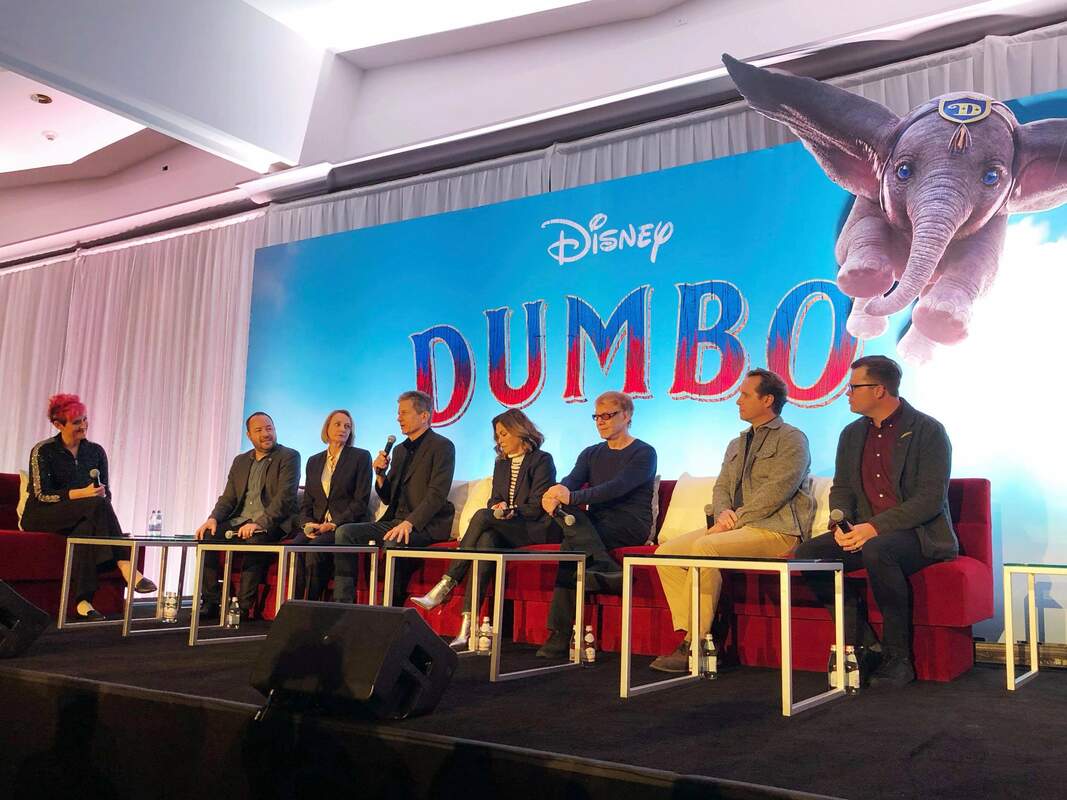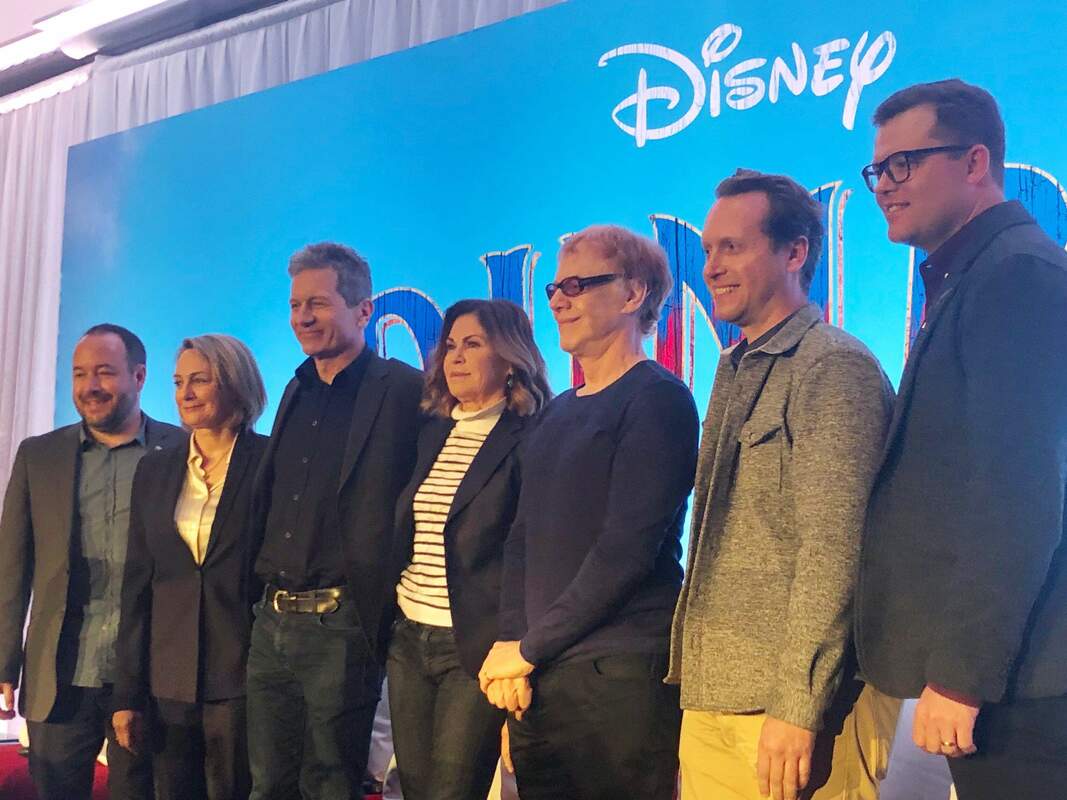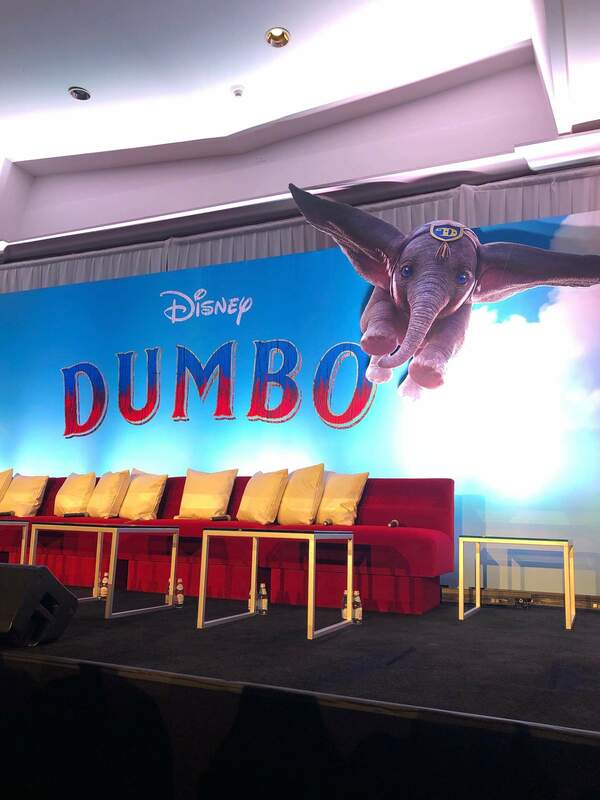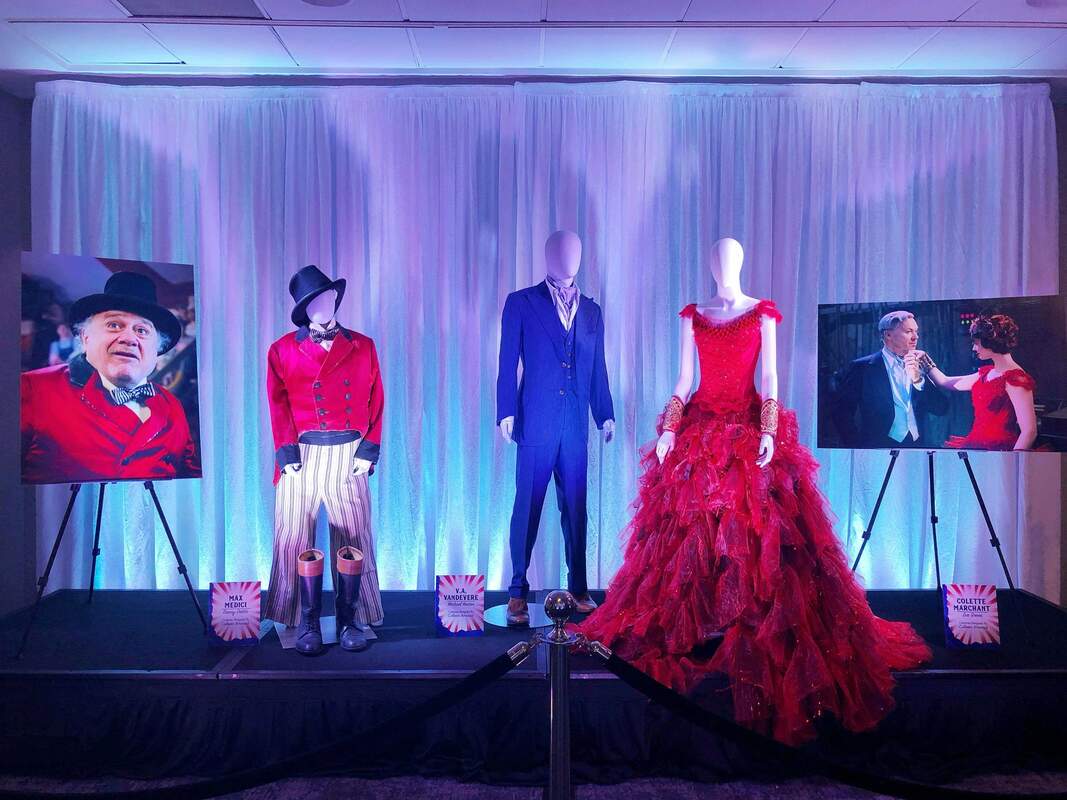|
*I was invited as media to attend the press junket for “Dumbo.” All thoughts and opinions are my own.* By Melanie Gable The Beverly Hilton Hotel in Beverly Hills, California was buzzing with excitement on Mar. 10 as members of the media gathered to hear from the cast and filmmakers about the making of Walt Disney Studio’s new live action movie “Dumbo.” Tim Burton is one of my all-time favorite directors, so when Monica asked me to cover the event for her blog, I jumped at the opportunity. We not only got to hear behind-the-scenes stories from the producers and artists behind the beautiful film (including Costume Designer Colleen Atwood and Composer Danny Elfman, both longtime Burton collaborators), but also from the lead actors and Tim Burton himself. So what inspired Walt Disney Studios to create a new version of “Dumbo”? From Animated Classic to Live Action Spectacular“Dumbo” soared into theaters in 1941 and went on to receive an Academy Award for best musical score, as well as a nomination for the original song “Baby Mine.” The film became a beloved classic for multiple generations, and Dumbo remains one of Disney’s most popular animated characters. Walt Disney Studios has been producing a steady stream of live action adaptations of their animated films over the last decade, including “Alice in Wonderland,” “Cinderella,” “The Jungle Book,” and “Beauty and the Beast,” with “Aladdin” and “The Lion King” to be released later this year. But “Dumbo” is a bit of a different story, as the action swirls around a rather humble character, a baby elephant with unusually large ears. Director Tim Burton, who is best known for making films about outsiders and oddballs, such as “Edward Scissorhands,” “The Nightmare Before Christmas,” “Beetlejuice,” and “Frankenweenie,” felt a kinship with Dumbo. Burton, dressed for the press conference entirely in black, with dark glasses and wild hair, was as delightfully eccentric in person as his fans might imagine. Said Burton of the appeal of Dumbo, “I just liked, it was just the idea of it - the idea of a flying elephant and the character that doesn’t quite fit into the world, and how somebody with a disadvantage makes it an advantage. So it just felt very close to the way I felt about things. It was just a very pure, simple image.” Producer Derek Frey, who has helmed Tim Burton Productions since 2001, gave further insight into Burton’s relationship to Dumbo. "Dumbo is one of the original outsiders, in a way. And Tim’s films are populated with outsider characters. Dumbo is almost like a personification of himself.” Continued Frey, “It’s a beautiful story. It’s about family. It’s about believing in yourself. It’s about overcoming judgment and people looking at you in a certain way. Dumbo is kind of a bullied character. I know that’s something that we’re dealing with socially right now.” “Dumbo” is Screenwriter/Producer Ehren Kruger’s favorite Disney animated film, and writing the screenplay was a form of wish fulfillment for him. “Dumbo is not just a Disney character. He’s a mythological character. And I wish he were real,” Kruger shared wistfully. “I wish I could have been in the audience…in the golden age of the circus, and observe his story. And then to take the next step, not just observe his story, but imagine what it’s like to be Dumbo. And that leads you to a place where you say, ‘What would Dumbo want, and is the end of the 1941 film truly a satisfying end for Dumbo?’ And so that just organically led to expanding the story past where the animated film ends.” Kruger clearly loves the little flying elephant, and spoke about Dumbo’s appeal to audiences. “Everyone sees themselves in the story of a character who has self doubt, who has flaws, who is defined as one thing by someone else.” Producer Justin Springer, who worked with Kruger on a past Disney project, sat down with the screenwriter for lunch to discuss bringing “Dumbo” back to the big screen. “We just started talking about 'Why Dumbo?’ and ‘Why now?’ and what might be interesting. Ehren had an early version of the story in mind that he and I started talking through. And I went to the studio and said, ‘Hey, Ehren is this writer that we all know and love, and he’s really excited about this title. Would you guys consider it? Would you be willing to hear a story from us?’ And they said yes.” Springer praised the “organic” development process, and the passion Kruger, Burton, and the other filmmakers brought to telling the story. “All of that kind of came from this really sort of beautiful place of people who really loved the original film…and [wanted to] find ways to carry that story forward and bring contemporary themes and ideas to it as well. It didn’t feel like an assignment or something somebody else wanted us to do. Rather, it came from this really natural kind of place.” The World of "Dumbo"Dumbo is born into a down-on-its-luck traveling circus at the end of World War I. Led by ringmaster Max Medici (Danny DeVito), who is barely holding on to his stable of misfit performers, the Medici Bros. Circus is merely a shadow of its former glory. Holt Farrier (Colin Farrell), once a star horseback performer, along with his wife, in Medici’s circus ring, returns from the war having lost an arm and much of his spirit. The children he left behind, Milly (Nico Parker) and Joe (Finley Hobbins), have been in the care of their circus family after their mother passed away from a flu epidemic. Holt struggles to reconnect with both his children and his trick-riding skills, and he’s demoted from headliner to animal caretaker. In an attempt to bring new audiences to the circus, Medici purchases an expectant mother elephant who soon gives birth to the baby Medici hopes will win the adoration of the crowds. But with his abnormally large ears, the baby elephant is considered a flop before he even takes to the ring. Said Screenwriter Kruger, “We worked very hard to create a menagerie of human characters - the circus family around Dumbo who all in some way were wrestling with uncertainty about themselves and their place in the world and, in fact, the circus’s place in the world.” When Dumbo soars, he’s an inspiration to the performers around him and, the filmmakers hope, to audiences worldwide. “I never really liked the circus,” confessed Burton. “But I like the idea of it…that sort of concept when you’re a child of running away to the circus. The idea of being with a bunch of other weird people from around the world that can’t get regular jobs.” Indeed, the “weird people” populating Dumbo’s circus are a motley crew, some with genuine talents and some who rely more on trickery, including magicians, animal trainers, a “mermaid,” a strong man, and a mischievous monkey. When Coney Island entertainment tycoon V.A. Vandervere (Michael Keaton) hears about Dumbo the Flying Elephant, he visits the Medici Bros. Circus to see the spectacle for himself, bringing along his star aerialist, Colette Marchant (Eva Green). Vandervere is unimpressed with the talent on display until he sees Dumbo soar around the ring. He’s convinced Dumbo will be an asset to his own highly successful circus show, part of a theme park of sorts called Dreamland, and seeks to purchase him from Medici. For her role as Dreamland’s enigmatic trapeze artist, Green trained daily for two months with aerialists and had to overcome her fear of heights. “I had the most amazing circus people who were very patient, very kind with me. Because I was absolutely petrified.” As Green gained strength and went higher and higher, she surprised herself with her abilities. “It was a miracle,” she declared. She greatly admires circus performers, adding, “I’m just in awe of the circus people because they work so hard. They’re so dedicated. And they train and train. They’re ready to sacrifice themselves, almost. Because they constantly have to overcome their fear as they put themselves in mortal danger. Actors, we’re nothing compared to those kind of superheroes.” DeVito and Burton had high praise for Green. Said DeVito, “You absolutely look like you were born to be on a trapeze. I mean, it was just amazing.” Burton shared that Green did many of her own stunts. “Eva, she worked. Nobody really knows this except people working on the movie how hard she worked at it. And she could do everything. There were certain cases where her person [stunt double Katharine Arnold] did it for her. But that’s the amazing thing about her. She was doing it.” Since Green was able to overcome her fear of heights working on the film, Burton offered his services to the audience at the press junket, joking that, “Anybody who needs any help with any problems - fears like clowns, heights, anything - I’m out in the lobby after the show. Thank you.” Both the Medici Bros. Circus and Dreamland environments required great artistry to capture both the grit and the glamour of circus life. Production Designer Rick Heinrichs collaborated closely with Burton to create the look of the film. “Every movie I’ve worked with Tim on, and I’ve known Tim for almost forty years now, has been an adventure unto itself. What I would say is that there is a shared visual shorthand, and I’m sure that all of his collaborators would say the same. And the exciting thing about working with Tim is, in many respects, you dig deep into the history and the period and all of the things that one normally does to bring all the toys to play with on the table. And then Tim sweeps all that aside and you sort of put it back together as a Tim Burton film. It’s always a blank canvas that you start with. It feels dangerous and exciting and challenging, and ‘Dumbo’ is certainly no different from any other time.” Producer Katterli Frauenfelder expanded on the evolution of the visuals in the film, including Dumbo himself. “It started with Tim’s sketches, which everything starts from. And it was a lot of work. Everybody was involved - Rick [Heinrichs], [Visual Effects Supervisor] Richard Stammers…but basically it was Tim’s eye that kept evolving towards how he wanted to see Dumbo. He didn’t want a ‘photo real’ character, he wanted something heightened.” According to Frauenfelder, the animation work on Dumbo didn’t conclude until about a week before the press junket, and the results were worth the efforts. She credits Burton’s vision in creating a character that “can bring out all the emotions that Dumbo should and does.” (On set, Dumbo was played by actor and creature performer Edd Osmond.) Oscar-winning costume designer Colleen Atwood is also a longtime Burton collaborator and had her work cut out for her with “Dumbo.” “I think the idea of creating a world on a performance level and on a kind of period level together is always an interesting challenge,” Atwood acknowledged. “It sort of bridges between fantasy and reality…combining five circuses - how they would all look, how the people in them would look - was a huge challenge.” So was managing the costuming of hundreds of actors every day. But Atwood loved working on the film. “The one thing that’s really amazing about this movie is that so much of it is real. When you’re in the room with all that going on, you realize you’re in a really magical, very rare place that you might not ever be in again in your life because movies are changing so quickly. And the sort of whole digital world is changing so quickly. But you really felt like you were in the moment in an old-time movie when we were shooting…which made it a really special experience for me. Forget the challenge. It was just the experience that was great.” Keaton had his own take on the film’s aesthetic, gushing, “It’s physically the most beautiful movie I’ve ever been in. I’m just going to say that. It’s unbelievably gorgeous if you asked me.” Burton's "Dysfunctional Family" of ArtistsWhen Tim Burton finds an actor or artist he enjoys working with, he’ll often collaborate with them again…and again…and again. Along with Atwood, Heinrichs, and several of the producers of “Dumbo,” Burton once more cast Green, DeVito, and Keaton, who have all been leads in his past films. When asked what Burton looks for in the artists he works with, he joked, “Look at them all. They all look weird.” (I would absolutely love to be as “weird-looking” as Eva Green or Nico Parker, who are both even more stunning in person than they are on screen, but I digress.) Joking aside, Burton had great praise for his cast and crew, explaining, “It’s very simple. And in this particular case, it’s a few things. Because ‘Dumbo,’ it’s a heightened reality…it’s a weird story about a weird family. It was very special to me to work with people that I’ve worked with. Michael, Eva, Danny…and Colin, I feel like I’ve worked with him for many years, because he’s got the same kind of spirit. And meeting Nico and Finley. Everybody, and Alan Arkin. Having a family, a weird dysfunctional family - like a film is and like the movie circus is - is very beautiful and important. And the spirit of all of them really meant the world to me in terms of what the movie is and the spirit that they all put into it.” Added Farrell, “And coming from an actual dysfunctional family, I felt like I fit right in. It was like Thanksgiving dinner.” DeVito and Keaton, who worked together on Burton’s “Batman Returns” as The Penguin and Batman, had a role reversal of sorts, with DeVito playing the more likable of the two characters in “Dumbo.” Shared DeVito, “When Tim called a year ago or whenever it was, and said he was making the movie, I was really thrilled to be able to be part of it. And then the joy factor went up through the roof when I heard that Michael was in it with me.” DeVito enjoyed the “family” that Burton created for the movie, and gushed about Burton himself. “I think he’s brilliant. I think he’s just a genius. Like his artistry. It’s just astounding. You give a talented person like Tim a subject like Dumbo, with all the great meaning and messages and metaphors, and what does he do? He sends it off into the stratosphere. And he’s one of a kind. He’s just amazing and we love him so much. We like to see him squirm.” Burton, who seemed physically uncomfortable with the praise, deadpanned, “Come on. I’ve got to be buried in, like, five minutes. So wrap it up, will you?” Keaton ignored Burton’s protests, turning to him and confessing, “It’s true. I’m sorry. You’re going to get sick of this. But it’s a rare thing to work with an original. And to be in the thick of it. To be right in the middle of a piece of art. Really we do have to stop this now. Because he is getting sick of this. But it’s true. It’s absolutely true.” Composer Danny Elfman, who has written some of the most haunting music ever put to film and received multiple Academy Award nominations, has left an indelible audio imprint on Burton’s films. “Dumbo” is their seventeenth film collaboration, and Elfman shared some thoughts on their many years working together, confiding, “I still never know what to expect from Tim at all. People think that, ‘Oh, you must have the shorthand, where it’s real simple.’ And I go, ‘No, actually, working with Tim is a lot less simple than a lot of other directors.’ His mind is strange and interesting. And I learned many years ago never to take for granted what I think he’s going to want.” Rather than talking about the music beforehand, Burton prefers to respond to what he hears. Added Elfman, “It’s always going to be a real interesting process, musically, getting to wherever we’re going to get. I just never know where that’s going to be. And usually it’s something that we have to find in process. So I think it’s a good way to work, actually. It’s all mystery.” But despite the challenges of working with Burton, Elfman says that most of his favorite scores he’s written have been for the director’s films. In the end, Elfman doesn’t care about the difficulties he faced during the process of writing a score if he loves what he’s created. “It’s kind of like having kids,” Elfman mused. “If you remember the first year, you never want to look at another kid again. But then they’re so cute and it’s so great. I find film scores to be somewhat similar. In the middle, I often say, ‘I’ll never do this again. I’m done.’ And then at the end, if it came out well, then I go, ‘Yeah, sure, I’ll do this again. It wasn’t so hard. Was it hard? I don’t remember.’ It kind of gets erased. It’s only the end product that matters, really. It’s all you remember later anyhow.” The Inspiring Spirit of DumboBurton described “Dumbo” as a “very simple fable, very simple story,” with every character trying to find their place in the world, including the titular baby elephant. An innocent creature who is originally mocked for his differences, Dumbo is eventually able to turn his perceived weaknesses into strengths and soar high above his critics, both literally and figuratively. It’s a message to which anyone who’s ever felt like a reject or misfit can relate. For his part, Farrell hopes that audiences will take away from the movie “the importance of not just accepting the inherent difference that people have from each other…but celebrating it. There are simple messages that are very complex, it seems, to live in as we go through our lives. And those messages are of kindness and inclusion and all those kind of things.” Green thoughtfully added, “I think everybody has felt at some point kind of a bit strange or different. It’s just such a wonderful movie because it has that message of, ‘No, it’s okay to be strange or different. It’s actually great. It makes you special.’ And we just have to embrace our uniqueness.” Check back here on Friday for my spoiler-free review of the film. Thank you again to Monica for inviting me to cover this amazing event for her! DUMBO opens in theaters everywhere on March 29th! Like DUMBO on Facebook: https://www.facebook.com/DisneyDumbo/ Follow DUMBO on Twitter: https://twitter.com/dumbo Follow DUMBO on Instagram: https://www.instagram.com/dumbo/ Visit the official DUMBO website here: https://disney.com/dumbo
1 Comment
Gloria
3/29/2019 11:45:33 am
What a great opportunity, I love all Tim Burton's movie
Reply
Leave a Reply. |
Categories
All
Archives
May 2023
|









 RSS Feed
RSS Feed

